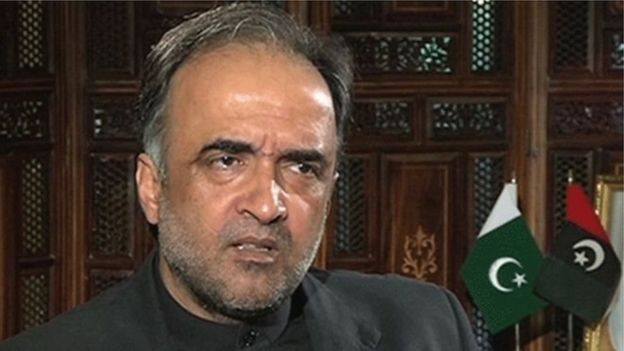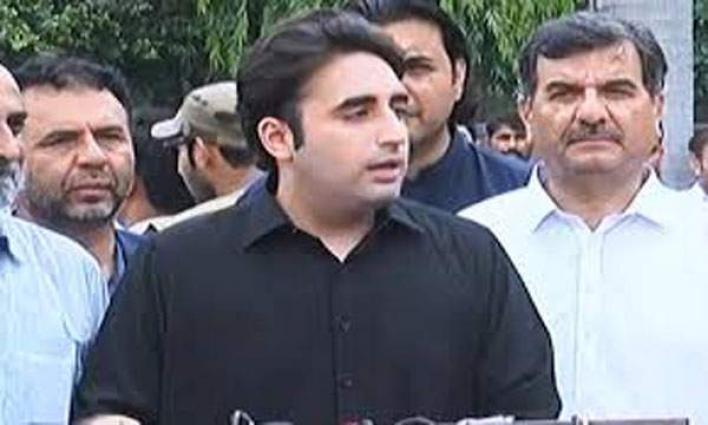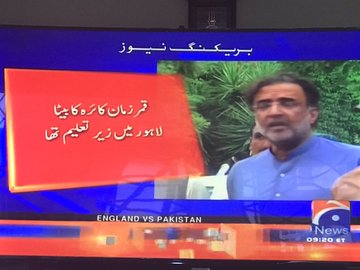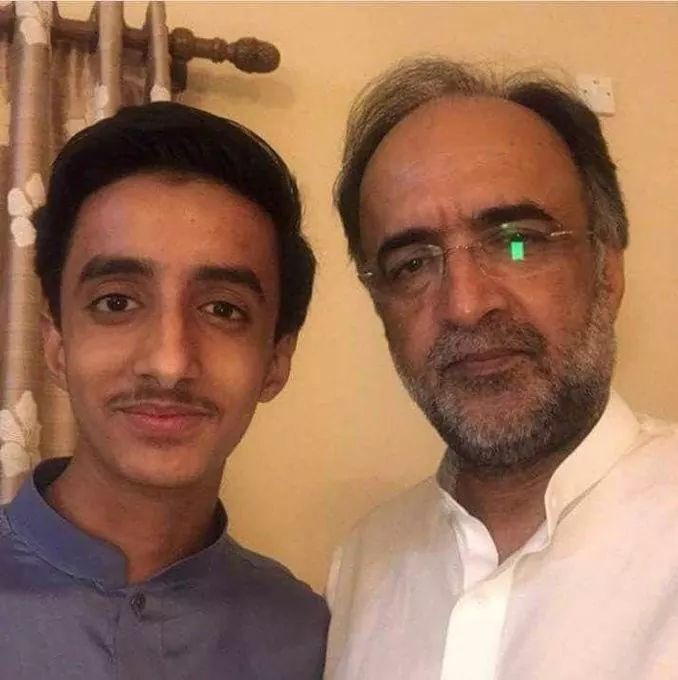M WAQAR..... "A man's ethical behavior should be based effectually on sympathy, education, and social ties; no religious basis is necessary.Man would indeed be in a poor way if he had to be restrained by fear of punishment and hope of reward after death." --Albert Einstein !!! NEWS,ARTICLES,EDITORIALS,MUSIC... Ze chi pe mayeen yum da agha pukhtunistan de.....(Liberal,Progressive,Secular World.)''Secularism is not against religion; it is the message of humanity.'' تل ده وی پثتونستآن
Friday, May 17, 2019
Pakistan Army’s Imran Khan Project Is Going Belly Up
Mohammad TaqiWith food commodities and energy prices rising, an element of public unrest, which could morph into even an agitation against the PTI government, remains a real possibility. Pakistan’s government and its army handlers are in a disarray. And the reason is not some concerted domestic political opposition or foreign pressure; it is the sheer incompetence of the army’s political protégés and the outfit’s ignominious tradition of biting off more than it can chew. Pakistan’s economy is in a virtual free-fall and the blame for it rests squarely with the army, which had upset the applecart of democracy by engineering former Prime MinisterNawaz Sharif’s ouster in 2017. Within a span of the past few weeks, finance minister Asad Umar – touted for a decade as the economics whizz-kid – was unceremoniously shown the door, the State Bank of Pakistan’s governor eased out and the chairman Federal Bureau of Revenue fired. In the face of a massive economic turmoil, cricketer-turned-politician Imran Khan’s Pakistan Tehrik-e-Insaf (PTI) government, which was virtually installed into power by the country’s powerful army last year through a stolen election, is running around like a chicken with its head cut off. Most, if not all, economic indices are headed in the wrong direction. The GDP growth has taken a nosedive from 5.4%in 2017 to 3.9% in 2019, while inflation skyrocketed from 4.2% in 2017 to 9.4% now and is projected to hover above 7% for the next fiscal year as well. The measly economic growth puts Pakistan at number six among its South Asian peers – a notch above Sri Lanka and Afghanistan – but behind even Nepal and Bhutan. The country has consistently trailed India and Bangladesh on economic growth and human development indicators for years on end. About a quarter of the country’s over 220 million population is living below the national poverty line and over 22 million children remain out of school. Faced with about $18 billion in fiscal shortfall, the PTI and the army approached the issue with hyper-nationalist posturing; the government first claimed that it won’t seek assistance from the International Monetary Fund (IMF) and then dithered over it for months. The civil-military combine had put great hopes in the so-called all-weather friends China, the Saudis and the UAE for a bailout. But they were not able to get even half the amount needed to bridge the country’s financial gap and remain current on its circular debt and imports payments.With public debt at 70% of the GDP, foreign exchange reserves sitting at a paltry $9 billion, poor exports and high imports, falling expatriate remittances, plunging stock market, a struggling industrial sector grappling with infrastructure nightmares like water and power supply, and faltering cotton-driven agroeconomics, the hyper-patriotic, chest-thumping Imran Khan and his backers went begging the IMF – for the 22nd time in the country’s history! And not just that, they agreed to install a new financial team that is essentially IMF and World Bank officials on deputation to Pakistan to carry out its harsh terms for the facility that is still being negotiated.What is lost on Khan and his task-masters, however, is that changing faces does not change the fundamentals of the economy. First and foremost, the key to economic development is political stability. By tripping democracy every step of the way and toppling even the weak democratic governments, the Pakistan army has repeatedly created uncertainty and chaos. And if there is one thing that the market economy despises more than a recession, it is uncertainty. Consumer confidence and spending, domestic industry, agriculture and stock markets, as well as the foreign investment, all dwindle when a pall of political uncertainty goes up over a country. Add to it the domestic Islamist terrorism problem – entirely a blowback of the army’s disastrous policy of using jihadists to prosecute its foreign policy – raging for a decade and a half, and the country doesn’t exactly look like the Xanadu that foreign investors would make a beeline for. The perpetual state of Cold War with Afghanistan and India, and the army’s refusal to allow free trade with both, hampers not only the domestic entrepreneurs seeking new markets but also disincentivises foreign investors. Political volatility, teeming extremists and friction with neighbours along with the perennial water, power, raw material and skilled labour shortages, have sunk Pakistan to 136 out of 190 in the World Bank’s Ease of Doing Business rankings.The flagship China-Pakistan Economic Corridor (CPEC) project with a purported $60 billion Chinese loans and investment, and a key component of China’s Belt and Road Initiative (BRI), is increasingly looking like a road to nowhere. What was trumpeted as an economic miracle in the works, has piled on external debt with little to show in terms of infrastructure development and job creation. The current-account deficit grew to over 5% of the GDP, thanks partly to borrowing under CPEC contracts. While even Khan’s government has murmured about the opaque nature of the CPEC projects and its viability in the context of massive debt burden, it is not at liberty to openly discuss it, because of the army’s, which has remained the mover and shaker of the project, overarching goal is security ties with China. From enabling Pakistan’s nuclear weapons programme to shielding the Pakistani jihadi terrorists, China has pulled the army’s chestnuts out of many geopolitical fires. And to this end, the army is willing to compromise on the viability of an economic mega-project in the name of national interest and security, which ironically it has anointed itself to define. Moreover, without opening up the trade with India and Afghanistan, the CPEC might remain the pie in the sky or debt-trap which Pakistan may find itself difficult to extricate from. Like the army’s monumental blunders in both all-out and proxy wars with the neighbours and against its own people, the CPEC is a far cry from being the economic game-changer that it was touted to be. The problem with the army’s obsession with becoming the sole arbiter of national interest and security is that it has arrogated itself the right to dictate domestic and foreign policies to suit that rather nebulous creed in which Pakistan and Islam are somehow in perpetual danger and the army is the only saviour they have. These twin delusions of paranoia and grandeur are actually feigned and self-serving to justify the outfit’s chokehold on the country and its resources. Additionally, anyone questioning these khaki masters of disasters is smeared as a traitor, sell-out and even outside the pale of Islam. By shutting out dissenting voices, alternative points of view and critical assessments, the junta has become a rather inbred clique that marches on from blunder to blunder. The army’s Imran Khan project was another such blunder, in which both the army and Khan convinced each other that if somehow they get rid of the traditional political forces – whom they labelled corrupt – they can put Pakistan on the path to economic prosperity. The double-trouble was convinced that politicians have hundreds of billions of dollars stashed away abroad, which the PTI would somehow retrieve with the wave of a magic wand. Needless to say, that particular bravado came to a naught. The PTI then launched a scheme for overseas Pakistanis to buy dollar bonds called Pakistan Banao (Build Pakistan), which also fell flat. As the maxim goes, then indecision has its own delays, and days are lost lamenting o’er lost days. All these gimmicks and demagogy delayed the inevitable: seeking the IMF bailout. It is highly likely that the IMF will yet again throw Pakistan an economic lifeline, but perhaps at more stringent terms and closer monitoring than it might have done eight months ago. The IMF formula is rather well known, with its insistence on recalibrating power prices upwards, removing subsidies, propping up exports and broadening the tax base and stopping haemorrhaging through evasion. At this late stage, it might break the free-fall but is unlikely to stop the slide. With food commodities and energy prices rising, an element of public unrest, which could morph into even an agitation against the PTI government, remains a real possibility. While the PTI ended up eating a humble pie, the real egg is on the army’s face, whose pet project Imran Khan is about to go belly up. Unfortunately, in its political engineering experiments, the army has brought Pakistan at the brink of bankruptcy and caused immense grief to its toiling masses. https://thewire.in/south-asia/pakistan-armys-imran-khan-project-is-going-belly-up
IMF’s $6 Billion Loan To Pakistan Risks Supporting Its Terror Infrastructure – OpEd
By Gautam Chikermane
There is a deeper politics at play here, a politics of negotiation and a transaction of international power games that is diluting the dangers of Pakistan’s brazen state-sponsored terrorism.
How long will the International Monetary Fund (IMF) continue to brush the world’s greatest problem of terrorism under the carpet of economics? For Pakistan, the two are joined at the hip — a deep state that creates, nourishes and exports terrorism from its soil as a state policy, while thriving on doles received from the US, China and multilateral institutions such as the IMF, the World Bank, and the Asian Development Bank. There is a deeper politics at play here, a politics of negotiation and a transaction of international power games that is diluting the dangers of Pakistan’s brazen state-sponsored terrorism.
The IMF’s 12 May 2019 press release follows this trajectory. For a state, whose sole achievement has been to become the hub of global terror, it is surprising that the T-word almost didn’t make the grade — it is carefully tucked away, almost incognito, in the seventh out of an eight-paragraph press release, virtually invisible. The release talks about a $6 billion loan (a 39-month extended fund arrangement), country’s 13th programme in the past few decades, and holds forth on the reforms Pakistan must undertake. This, when the country already owes $5.8 billion to the IMF from past bailouts, of which it has completed the programme only once.
“Priority areas include improving the management of public enterprises, strengthening institutions and governance, continuing anti-money laundering and combating the financing of terrorism efforts, creating a more favourable business environment, and facilitating trade,” the IMF release states. Further, the loan comes with several growth catalysing conditions attached. These include:
- Improve public finances and reduce public debt through tax policy and administrative reforms
- Ensure a more equal and transparent distribution of the tax burden
- Cost-recovery in the energy sectors and state-owned enterprises to the quasi-fiscal deficit
- Its budget for FY2020 to aim for a primary deficit of 0.6% of GDP
- The State Bank of Pakistan to focus on reducing inflation
- Pakistan should move to a market-determined exchange rate
The humiliation of the IMF dictating how a nation should deliver economic governance aside, none of these are easy. If Pakistan moves to a market-determined exchange rate, for instance, its currency will crash further, after having fallen by 22% over the past 12 months, and 35% over the past 24 months. A further depreciation of the Pakistani rupee would mean the cost of servicing its foreign debt will rise. What Pakistan may face soon is a debt trap, a condition where the country will need to borrow to pay interest, the principal remaining untouched. To put this in perspective, it is only a matter of days and a depreciation of just 2% for the currency-adjusted GDP of Pakistan, currently at $280 billion, to fall below Bangladesh’s $274 billion.
Further, if inflation needs to be brought down using monetary policy, it can only be done by hiking interest rates. Here too, the economy is under severe pressure — the policy rate stands at 11.25% today, it was 7% last year, and less than 6.5% two years ago. The 20% fall in Pakistan’s market, the Karachi Stock Exchange KSE30, over the past 12 months is a sign that takes both these factors, a falling currency and a rising interest rate regime, into account. Clearly, even as the IMF is entering Pakistan, smart money is exiting its markets. The IMF is hoping for reforms, investors know Pakistan will not eschew its past habits.
A beggarly situation is not new to this country. Between 1948 and 1953, the US provided $121 million CV economic assistance to Pakistan, writes Husain Haqqani in his fascinating book, Reimagining Pakistan: Transforming a Dysfunctional Nuclear State. This rose to more than $45 billion between 1954 and 2017. US aid has been augmented by concessional loans from other developed countries, including the ‘Paris Club’, and multilateral institutions. “On several occasions, Pakistan’s usefulness to the US in the strategic realm determined the lenders’ decision to provide debt relief,” Haqqani writes.
Now that the US is receding, the space for financial assistance from the West is reducing. Can China fill in the vacuum left by the US? Strategically, the geography of Pakistan to China is as important, if not more, as it was to the US. China seeks to control the rise of India, and where Pakistan, its ‘Iron Brother’ and partner-in-hate, is a willing geography provider. The China-Pakistan Economic Corridor needs to be seen in this light — a geography-for-alms transaction, where Pakistan provides strategic geography through the corridor that passes through Balochistan, a politically volatile province seeking independence from Pakistan, right up to the Gwadar Port, while China provides the alms to support the military-terrorist deep state as a fence against India.
What is surprising is the fact that while the US has been suspicious of the IMF loan being used by Pakistan to repay “debts incurred from predatory Chinese infrastructure projects,” there has been no public assurance to the contrary so far. On the contrary, the world is seeking greater transparency of Pakistan’s debt to China, which suits neither of them. Even if Pakistan assures the world that it will not divert funds to China, it may use them to invest in and strengthen its terrorist infrastructure.
A saving grace comes in the form of the IMF loan being incumbent upon timely implementation of “prior actions.” The world can only hope that this precondition is met. The stakes of international negotiations and power plays must not overpower the need for terror-free coexistence. Otherwise, by restricting itself to economic indicators, the IMF risks becoming a partner that ends up funding Pakistan’s terror activities.
Pakistani rupee sinks to new low of 150/dollar as IMF bailout conditions begin to bite
NAYANIMA BASU
Pakistan’s economy is on the brink of collapse, and the IMF sanctioned a $6 billion loan last week on the condition that the rupee be left to perform freely.
The Pakistani rupee touched a record low of Rs 150 per US dollar Friday, increasing the pressure on Prime Minister Imran Khan to stabilise the country’s economy and tame its spiralling currency.
The day before, when the value had touched Rs 148 to the dollar in the inter-bank market, Khan had asked currency dealers to lower the rate. The government had also informed dealers that stringent action would be taken against those who were found selling dollars at expensive rates.
“The Pakistani government has long kept currency under its control while manipulating its real value. But now it is no longer possible with the IMF watching over it,” a high-ranking Indian official told ThePrint, requesting anonymity.
The official said one of the main conditions that the IMF had put on Pakistan before it agreed to grant a $6 billion loan to Islamabad last week was to keep the rupee performing “freely as per the market conditions”. This loan, the 13th of its kind, was granted to save Pakistan’s economy from collapsing.According to diplomatic sources, Khan’s government is now planning measures such as raising interest rates and announcing massive austerity measures to stabilise the economy.
Bleak outlook
Abid Qamar, spokesperson for Pakistan’s central bank, said in a statement Thursday that the value of the rupee reflects demand and supply conditions in the foreign exchange market, and that it would help in “correcting market imbalances”.
The IMF had said on 12 May that a “market-determined exchange rate” would help the Pakistani economy.
However, renowned Pakistani economist Kaiser Bengali, the former adviser to Sindh and Balochistan, recently said in a lecture to the Arts Council of Pakistan that “the World Bank and the IMF have taken over total control of the Pakistani economy and have established their stranglehold on it”.
Meanwhile, the Pakistani government has announced the creation of a body headed by PM Khan’s adviser on finance Hafeez Shaikh to only focus on the rupee and its impact on the economy.
The committee has been asked to ascertain whether the provision of carrying $10,000 for anyone travelling abroad from Pakistan can be slashed to $3,000.
Amit Bhandari, fellow at Mumbai-based think tank Gateway House, predicts a bleak future for the Pakistani rupee.
“I can clearly say that the Pakistani rupee will come to a level of Rs 200 against the dollar in the next three years. The IMF had made it clear to Pakistan before the loan was signed that its central bank has to let the rupee flow freely,” said Bhandari, who analyses the Pakistani economy closely.
Reforms needed
Bhandari added that the Pakistani government has kept a fixed exchange rate to keep the currency under control, and said while foreign remittances by Pakistani expatriates that amount to around $20 billion may help in stabilising the dwindling economy to some extent, as a long-term measure, Islamabad has to gradually cut down on its military spending.Meanwhile, Nisha Taneja of the Indian Council for Research on International Economic Relations (ICRIER) said Pakistan needs reforms.“To be able to negotiate the package with the IMF, Pakistan needs to demonstrate that it can take reform measures. Devaluation is only one of the many steps that Pakistan has taken. Raising tax revenues will be far tougher for the government.”
Taneja, who has been spearheading efforts to normalise trading relations between India and Pakistan, added: “A slew of other reform measures need to be implemented if Pakistan is negotiating a loan with the IMF.”
قمرالزمان کائرہ کا جواں سال بیٹا ٹریفک حادثے میں ہلاک #QamarZamanKaira - #PPP
پیپلز پارٹی پنجاب وسطی کے صدر قمر الزمان کو اپنے جواں سال بیٹے کی ٹریفک حادثے میں ہلاک ہونے کی خبر اسلام آباد میں ایک پریس کانفرنس کے دوران ملی۔ قمر الزمان پریس کانفرنس ختم کر کے فوراً لالہ موسی روانہ ہو گئے۔
قمر الزمان کا بیٹا اسامہ قمر گورنمنٹ کالج لاہور میں زیر تعلیم تھا اور ان کا انتقال لالہ موسیٰ میں ہونے والے ٹریفک حادثے میں ہوا۔
وزیراعظم عمران خان نے قمر الزمان کائرہ کے جواں سال بیٹے کی وفات پر افسوس کا اظہار کیا اور غمزدہ والدین اور خاندان کے صبر کی دعا کی۔
قائد حزب اختلاف شہباز شریف نے بھی پی پی رہنما کے جواں سال بیٹے کے انتقال پر تعزیت کا اظہار کرتے ہوئے کہا کہ غم کی اس گھڑی میں کائرہ فیملی کے ساتھ ہیں۔
چیئرمین پیپلز پارٹی بلاول بھٹو نے قمر زمان کائرہ سے ان کے بیٹے کے انتقال پر تعزیت کرتے ہوئے کہا کہ جواں سال بیٹے کے انتقال کی اندوہناک خبر سن کر شدید صدمہ ہوا، خدا سے مرحوم کے درجات کی بلندی کے لیے دعاگو ہوں۔
پاک فوج کے شعبہ تعلقات عامہ (آئی ایس پی آر) کے مطابق آرمی چیف جنرل قمر جاوید باجوہ نے جواں سال اسامہ قمر کے انتقال پر افسوس کا اظہار کیا۔
آئی ایس پی آر کا کہنا ہے کہ آرمی چیف نے سوگوار والدین کے لیے ناقابل تلافی صدمہ برداشت کرنے کی دعا کی۔
#QamarZamanKaira - #PPP - Bilawal Bhutto Zardari Suspends All Political Engagements For One Day
Chairman Pakistan People's Party Bilawal Bhutto Zardari Friday announced to suspend all political engagements for one day in wake of saddemise of the PPP leader Qamar Zaman Kaira's son.
"All the political activities will be suspended on Saturday" Bilwal Bhutto said in a statement issued by the party secretariat.
#QamarZamanKaira - #PPP leader Qamar Zaman’s son dies in a road accident
PPP leader Qamar Zaman Kaira’s son, Usama Qamar, was killed in a road accident in Gujrat’s Lala Musa on Friday.
A PPP spokesperson said Usama’s car crashed into a tree. He was on his way to Islamabad.
Usama was studying at a college in Lahore. Qamar Zaman received news of his son’s death during a press conference in Islamabad.
Prime Minister Imran Khan, opposition leader Shehbaz Sharif, PPP’s Bilawal Bhutto and Asif Ali Zardari and other politicians offered their condolences to Qamar Zaman and his family over the tragic demise of Usama.
Condolences for Qamar and his family have also started pouring in from PPP leaders and others on Twitter.
We are all devastated by this news. He was in the middle of a press con when he heard! It’s a terrible loss for any parent and family. May God give @QamarZamanPPP the strength and fortitude to bear this tragedy.
145 people are talking about this
Really saddened to hear the demise of @QamarKairaPPP 's son Osama, in a traffic accident. He was a student at GC Lahore, the accident took place at Lala Musa.
Let's all pray for him, May Allah bless his soul and give patience to his family. Ameen.
Such a young boy, very sad!
See Zain Khan's other Tweets
Very sorry to hear tragic news of Qamar Zaman Kaira's son death in road accident. May Allah Bless his soul and Grant patience to the family Ameen!
975 people are talking about this
I am very sad to know about the accident and demise of Qamar Zaman Kaira’s son. Extremely tragic news to share. My deepest condolences with @QamarKairaPPP Sahib and family.
May Allah grant them sabar to bear this loss.
My heart and thoughts is with them now
My heart, thoughts, and prayers for the Kaira Sahib and family. Allah kisi ko aulad ka yeh Gham na dikhaayepic.twitter.com/roWKsNmR69
50 people are talking about this












